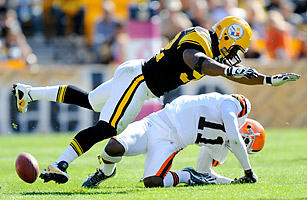
On a first down play during the October 17 game between the Pittsburgh Steelers and Cleveland Browns, Cleveland quarterback Colt McCoy dumped a short pass to wide receiver Mohamed Massaquoi, near the 50-yard line. As Massaquoi turned up field, Pittsburgh linebacker James Harrison charged toward him, like a missile, and delivered a crushing, stomach-churning helmet-to-helmet hit. The impact left Massaquoi dazed on the grass, and he would end up being diagnosed with a concussion. But the reverberations of that play, along with an earlier Harrison huge hit on another Browns player and a handful of other head-to-head collisions around the NFL that day, may be felt for years to come on the gridiron.
With science shedding further light on the long-term physical and mental damage caused by football violence, the NFL responded aggressively to the hits, telling players that the league would increase fines and issue suspensions for those who violated safety rules which have actually been in place for several years. Harrison himself was fined $75,000; he threatened to retire rather than change his kamikaze style. He later backtracked, but many NFL players seemed to disdain the league's anti-violence stance. Chicago Bears middle linebacker Brian Ulracher, for example, derisively said officials were turning pro football into the "NFFL" — the National Flag Football League. Ulracher and others may rip the new crackdown today. But years from now, if they're lucky enough to avoid the brain trauma that has befallen so many retired players, they'll likely be changing their tune.